Step-by-Step Guide for 2025-2026
How to Select a Dissertation Topic: Choosing a dissertation topic is one of the most important and sometimes most daunting steps in your academic journey. Your topic not only sets the direction for months of research but also significantly impacts the quality of your dissertation, your motivation while writing, and even your future career opportunities. Many students struggle with deciding on a topic because they either feel overwhelmed by the possibilities, are unsure about what is feasible, or worry about aligning it with academic expectations and career goals.
This guide provides a structured, step-by-step approach to help you navigate this critical decision. It is designed to help students at all academic levels, from undergraduates exploring broad ideas to PhD candidates seeking highly original and in-depth research topics. By following this guide, you will learn how to:
- Identify areas that genuinely interest you and align with your strengths.
- Conduct an initial literature review to spot research gaps or underexplored areas.
- Evaluate the feasibility, relevance, and originality of your potential topic.
- Align your topic with university-specific expectations and academic standards.
- Avoid common mistakes that many students make when choosing a dissertation topic.
Whether your goal is to produce a practical research project, a data-driven analysis, or an original contribution to knowledge, this guide will equip you with the tools and insights you need to move confidently from a broad area of interest to a focused, manageable, and impactful dissertation topic.
With expert guidance from ProjectsDeal.co.uk, you’ll gain clarity, reduce stress, and set yourself up for success in every stage of your dissertation journey.
Why Choosing the Right Dissertation Topic is Crucial
Your dissertation is one of the most significant academic projects you will undertake, often accounting for a large portion of your final grade. It represents not just a test of your knowledge, but also your ability to conduct independent research, think critically, and contribute meaningfully to your field.
Selecting the right dissertation topic from the start can have a major impact on your motivation, workflow, and academic success, while choosing the wrong topic can create unnecessary stress and obstacles. The following table highlights the key benefits of choosing the right topic versus the risks of selecting the wrong one:
| Choosing the Right Topic | Choosing the Wrong Topic |
|---|---|
| High engagement and motivation: You will enjoy working on your research and stay motivated throughout the dissertation process. | Lack of interest: You may lose motivation and struggle to stay focused over the months of research and writing. |
| Feasible research: Access to sufficient data, resources, and literature makes completing your dissertation manageable. | Resource challenges: Difficulty finding relevant literature, data, or research tools can make your work stressful and incomplete. |
| Better academic performance: A well-chosen topic aligns with your program requirements and academic expectations, increasing the chance of high grades. | Poor academic results: Misaligned or impractical topics can lead to subpar work and lower grades. |
| Skill development: Opportunity to develop expertise in a field relevant to your career goals. | Missed learning opportunities: You may not develop useful skills or knowledge relevant to your future career. |
| Smooth workflow: Research and writing proceed logically without major obstacles or wasted effort. | Increased stress and delays: Unrealistic or unclear topics can cause frustration, time pressure, and missed deadlines. |
| Academic contribution: Your dissertation may provide valuable insights or findings in your field. | Limited impact: Your work may lack originality, relevance, or significance in your academic field. |
Selecting the right dissertation topic ensures a productive, rewarding, and successful dissertation journey, while choosing the wrong topic can result in unnecessary challenges, wasted effort, and increased stress.
Need help selecting the perfect topic?
Check out their curated list of dissertation topics here: https://projectsdeal.co.uk/dissertation-topics.aspx
ProjectsDeal.co.uk offers expert guidance to help you choose a topic that aligns with your interests, academic level, and career goals—ensuring a smooth and successful dissertation journey.
Steps for Choosing the Right Dissertation Topic
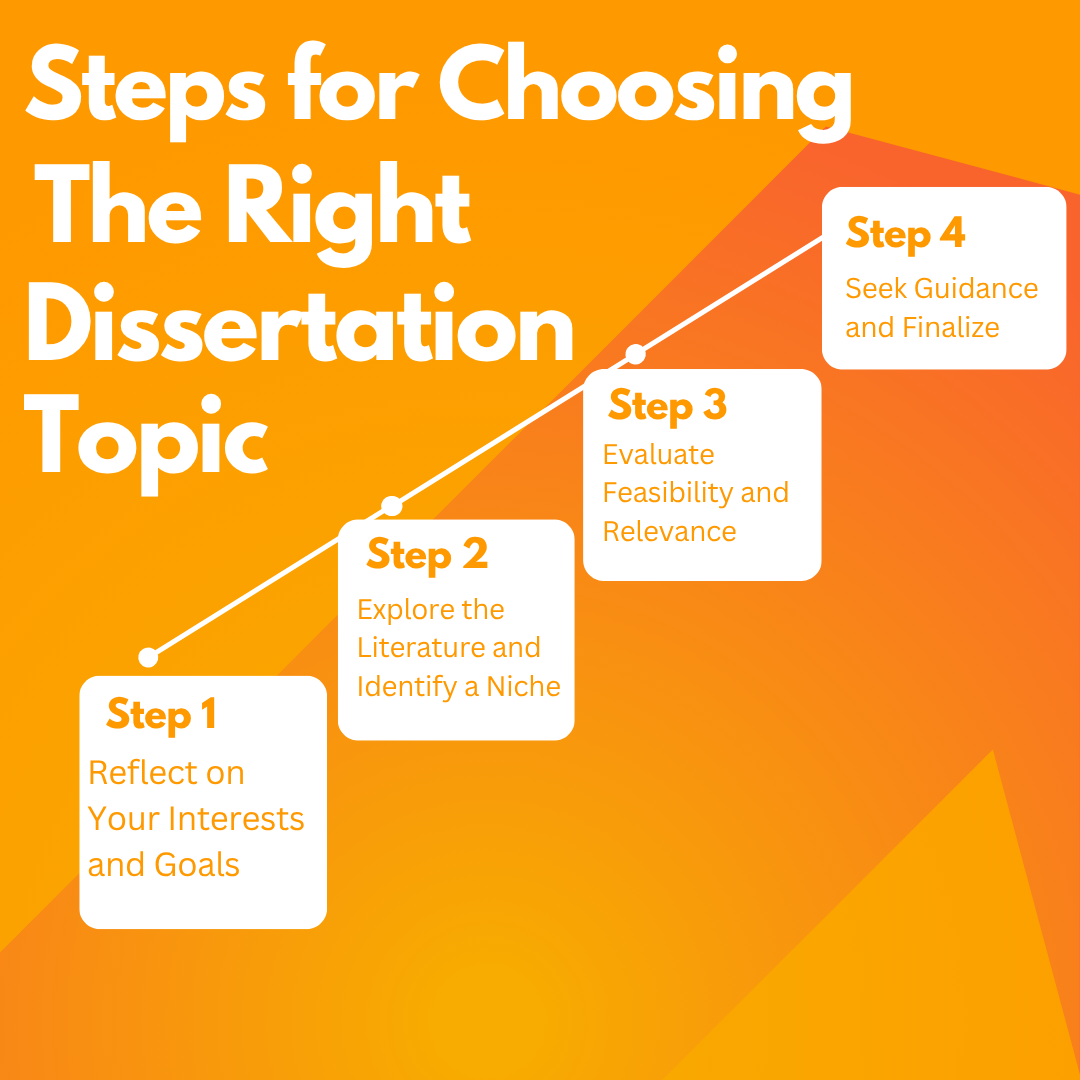
Step 1: Reflect on Your Interests and Goals
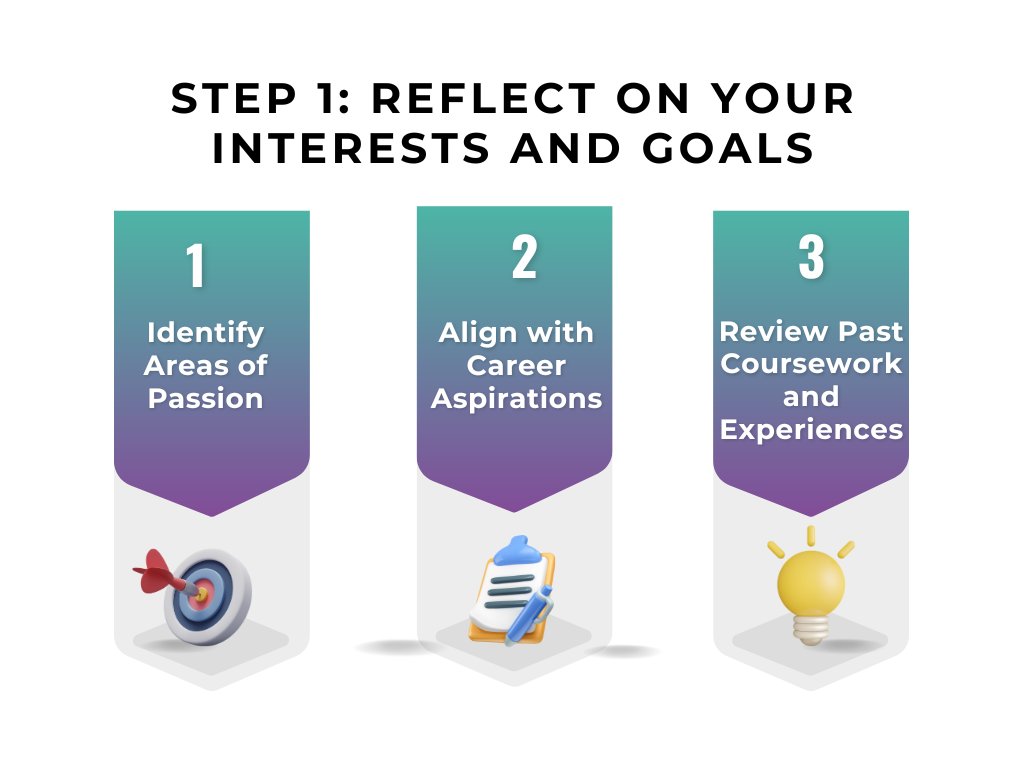
The first step in selecting a strong dissertation topic is to look inward and assess your own interests, strengths, and long-term goals. A topic that resonates with you personally will keep you motivated throughout the months of research and writing.
1. Identify Areas of Passion
Choosing a topic that genuinely excites you is essential. Think about the subjects, modules, or themes during your studies that sparked curiosity or enthusiasm. Ask yourself:
- Which topics do I enjoy reading or learning about the most?
- What issues or questions do I find myself thinking about outside of class?
- Are there real-world problems I am passionate about exploring?
Example:
If you are a Psychology student fascinated by mental health, you might consider topics like “The Impact of Social Media on Teen Anxiety” or “Effectiveness of Cognitive Behavioral Therapy in Managing Stress in College Students.”
2. Align with Career Aspirations
Your dissertation can also serve as a stepping stone for your future career. Consider how your topic could help you:
- Develop specialized skills or expertise that are valuable in your chosen field.
- Build a portfolio of research that impresses potential employers or academic supervisors.
- Explore a niche area where you could position yourself as an emerging expert.
Example:
If you aim to work in the field of Artificial Intelligence, a Computer Science student could focus on “Using Machine Learning Algorithms to Detect Cybersecurity Threats”, which both enhances technical skills and aligns with industry demand.
3. Review Past Coursework and Experiences
Look back at assignments, essays, or projects you particularly enjoyed or excelled in. These can provide inspiration and a foundation for your dissertation topic. Additionally, consider unique experiences such as:
- Internships or placements you’ve completed.
- Study abroad or exchange programs that exposed you to different perspectives.
- Extra-curricular projects or volunteer work that relates to your field.
Example:
If you completed an internship in a marketing firm, a Business student could explore “The Role of Influencer Marketing in Consumer Purchase Decisions.” Similarly, a student who volunteered in healthcare could research “The Effectiveness of Remote Patient Monitoring in Improving Chronic Disease Management.”
By reflecting on both academic performance and personal experiences, you can identify potential areas of research that are both feasible and meaningful.
💡 Pro Tip: At this stage, don’t worry about narrowing your topic too much. The goal is to generate a broad list of areas that interest you, which can later be refined into a focused dissertation question.
Need expert help finding the perfect dissertation topic? ProjectsDeal.co.uk can guide you every step of the way, ensuring your topic aligns with your interests, academic level, and career goals.
Step 2: Explore the Literature and Identify a Niche
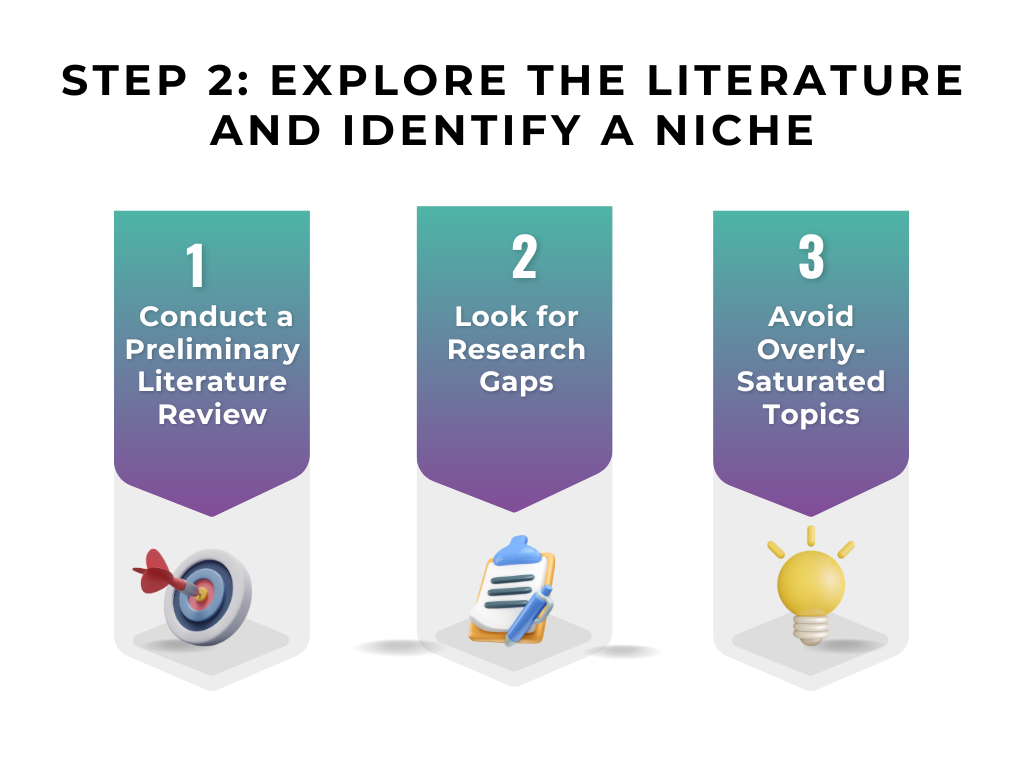
Once you have a general idea of your interests and goals, the next step is to explore existing research and identify a specific area where your dissertation can make a meaningful contribution. This step ensures that your topic is grounded in academic evidence while leaving room for originality.
1. Conduct a Preliminary Literature Review
Start by reading widely in your field to understand what research has already been done. Focus on:
- Academic journals: Peer-reviewed articles often highlight current trends, debates, and unresolved questions.
- Books and edited volumes: These provide theoretical frameworks and comprehensive overviews of your topic.
- Previous dissertations: Reviewing past dissertations from your university or online repositories can reveal gaps and methodologies.
Example:
A Business student interested in remote work might skim recent journals on employee productivity, workplace culture, and digital collaboration tools to see what questions remain unanswered.
2. Look for Research Gaps
After familiarizing yourself with the literature, identify areas that are under-researched, controversial, or where existing theories could be applied in new ways. A research gap could be:
- An unanswered question in your field, such as the impact of a new technology or policy.
- A population or context that hasn’t been studied, like specific age groups, industries, or regions.
- An existing theory that hasn’t been tested in a different environment or culture.
Example:
A Psychology student reviewing studies on anxiety interventions may notice that most research focuses on adults, leaving a gap in understanding how CBT affects teenagers in online learning environments.
3. Avoid Overly-Saturated Topics
While it’s important to build on existing research, avoid topics that are overly studied or too broad, as this can make it difficult to offer a unique contribution. Instead, aim for a specific angle or fresh perspective.
Example:
Instead of choosing a broad topic like “The Impact of Social Media on Mental Health,” you could focus on a more precise area, such as “The Role of Instagram Influencers in Shaping Body Image Perceptions Among College Students.” This allows you to contribute something new and manageable within your research timeline.
💡 Pro Tip: Use tools like mind maps, research databases, and literature matrices to organize your reading and track gaps. This will make it easier to identify a unique niche for your dissertation.
Need help pinpointing a research gap and narrowing your topic? ProjectsDeal.co.uk offers expert guidance to help you explore literature, identify niches, and choose a dissertation topic that is both original and feasible.
Step 3: Evaluate Feasibility and Relevance
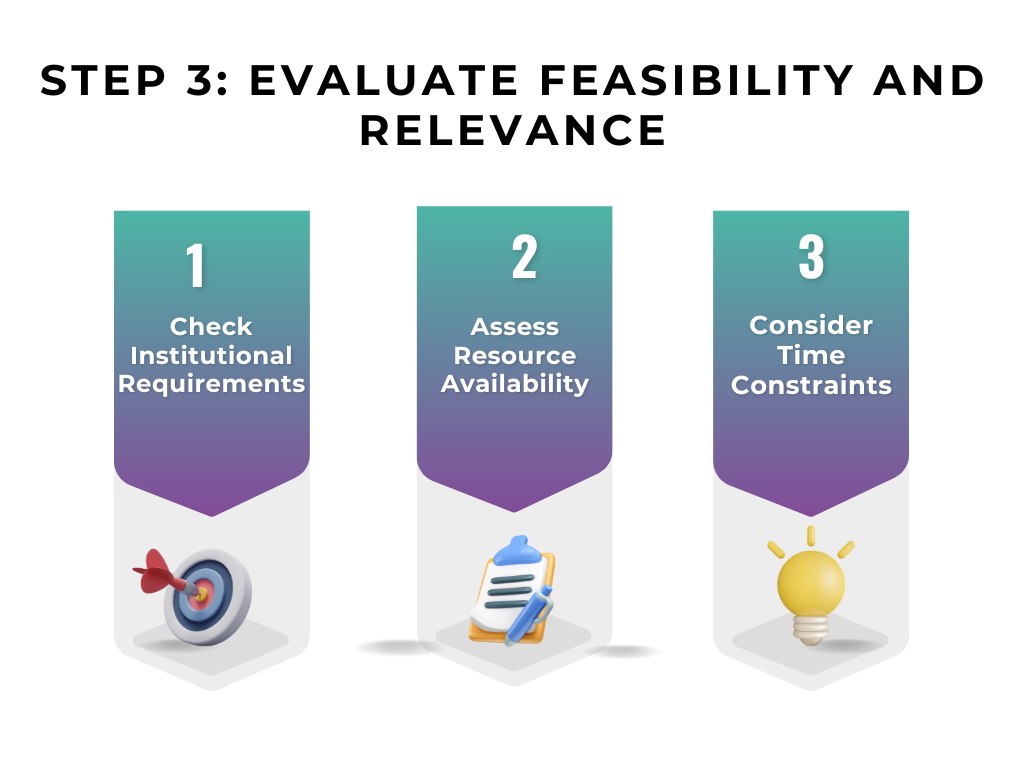
Once you have identified potential topics and research gaps, the next crucial step is to assess whether your topic is feasible and relevant. Even a highly interesting topic can become a challenge if it isn’t practical or aligned with your academic requirements.
1. Check Institutional Requirements
Every university and department has specific guidelines for dissertations. Make sure your topic:
- Fits the expected word count and scope.
- Aligns with research methodology requirements, whether qualitative, quantitative, or mixed-methods.
- Meets submission deadlines and any intermediate milestones.
Example:
If your program requires a 10,000-word dissertation using empirical data, a broad theoretical topic like “The Future of AI in Society” might be too vague. Instead, narrow it down to “The Impact of AI Chatbots on Customer Service in UK Retail” to meet requirements.
2. Assess Resource Availability
Even the most exciting topics need access to data, resources, and tools. Before finalizing your topic, ask yourself:
- Can I access the necessary data or participants for research?
- Do I have the required software, lab equipment, or funding?
- Are there field sites, libraries, or archives available to support my study?
Example:
A Healthcare student wanting to study remote patient monitoring must ensure they can access hospitals or patient data while complying with privacy regulations.
3. Consider Time Constraints
Be realistic about what can be achieved within your dissertation timeline. Some research methods take more time than others:
- Original data collection, like surveys, interviews, or experiments, may take weeks or months.
- Secondary data analysis, literature reviews, or case studies are often faster but still require careful planning.
Example:
A student planning a cross-country survey may face logistical delays, so a smaller-scale study in a local region might be more feasible.
4. Ensure It Is Researchable
Your topic should strike a balance between complexity and manageability:
- Complex enough to warrant an in-depth dissertation.
- Specific enough to be completed within your resources and timeline.
- Can be framed as a clear, answerable research question.
Example:
Instead of a broad question like “How does social media affect society?”, refine it to “How does Instagram usage influence body image perceptions among UK college students?”
💡 Pro Tip: Create a short checklist for feasibility:
- Alignment with university guidelines
- Availability of data and resources
- Realistic within the time frame
- Researchable and specific
Need help evaluating feasibility and choosing a researchable topic? ProjectsDeal.co.uk guides students in selecting topics that are both academically relevant and achievable, ensuring a smooth dissertation journey.
Step 4: Seek Guidance and Finalize
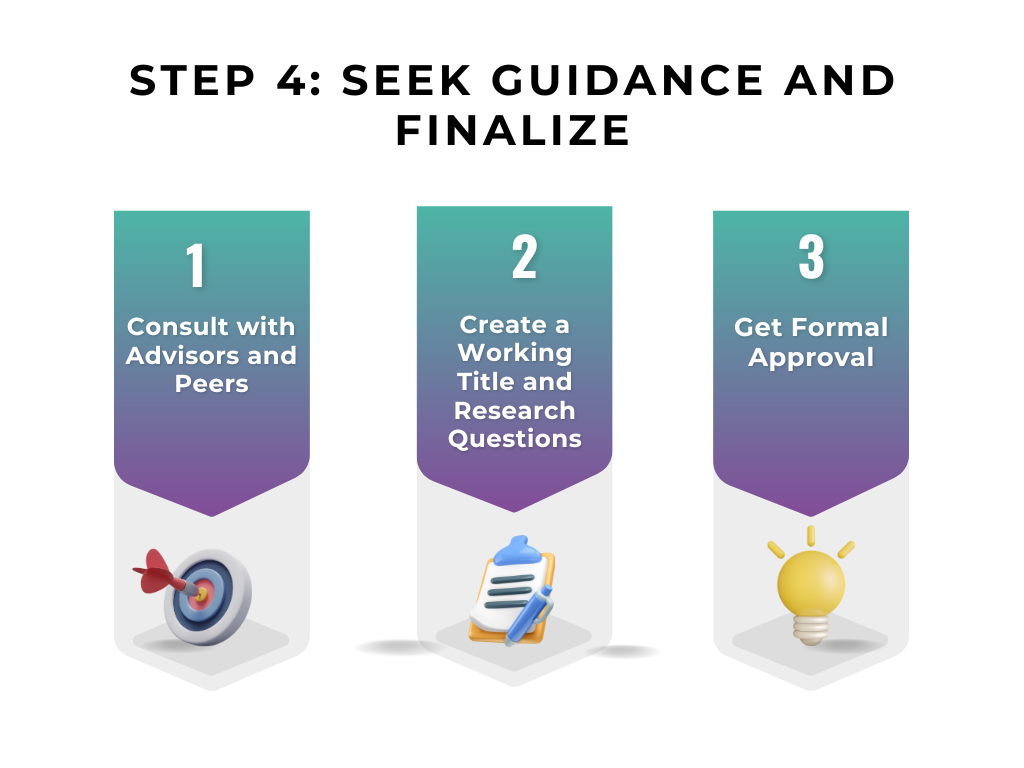
After reflecting on your interests, exploring the literature, and assessing feasibility, the final step is to seek guidance and finalize your dissertation topic. This ensures your research is academically sound, focused, and approved by your institution.
1. Consult with Advisors and Peers
Discussing your ideas with professors, academic advisors, or experienced peers is crucial. They can:
- Provide expert feedback on whether your topic is feasible and researchable.
- Suggest ways to refine your focus or identify additional research gaps.
- Point out potential methodological challenges or ethical considerations you may not have considered.
Example:
If you plan to study the impact of AI on healthcare, your advisor might recommend narrowing the focus to a specific application, such as AI-based diagnostic tools in hospitals, rather than studying AI in healthcare broadly.
2. Create a Working Title and Research Questions
Once you have refined your topic with guidance, draft a working title and research questions. These should:
- Clearly summarize the focus of your dissertation.
- Be specific, measurable, and researchable.
- Guide your methodology and structure.
Example:
Working Title: “The Impact of Telehealth Services on Patient Satisfaction in UK Hospitals”
Research Questions:
- How do patients perceive the quality of care delivered via telehealth?
- What are the key factors influencing patient satisfaction in remote consultations?
- How does telehealth impact healthcare accessibility and efficiency?
3. Get Formal Approval
Before starting your dissertation, most programs require a formal research proposal or prospectus. This typically includes:
- Your topic and working title
- Research questions and objectives
- Methodology and data collection plan
- Expected outcomes or contributions to the field
Submitting your proposal ensures that your supervisor or committee approves your topic and confirms that your research meets academic standards.
💡 Pro Tip: Treat feedback as constructive. Even small refinements at this stage can save weeks of work later and make your dissertation more impactful.
Need expert help refining your topic and getting it approved? ProjectsDeal.co.uk assists students in finalizing their dissertation topics, crafting research questions, and preparing proposals that meet university standards.
Academic Level Considerations
Dissertation expectations vary depending on your academic level. Choosing a topic appropriate to your level ensures that your research is feasible, aligns with academic requirements, and helps you develop relevant skills.
| Academic Level | Topic Focus | Example Topics | Key Considerations |
|---|---|---|---|
| Undergraduate | Broad, exploratory, practical | “Impact of Social Media on Teen Mental Health” | Focus on learning and understanding core concepts; manageable within a semester; develop basic research skills and critical thinking. |
| Master’s | Focused, analytical, research-oriented | “The Role of AI in Transforming Marketing Strategies” | Requires critical thinking, advanced literature review, and application of research methods; aims to produce deeper insights and demonstrate independent research capability. |
| PhD | Highly original, in-depth, contributes to knowledge | “Developing Sustainable Energy Models Using Machine Learning” | Must be highly innovative and fill a gap in existing research; requires significant time, resources, and expertise; aimed at contributing new knowledge to the field. |
💡 Pro Tip: Your dissertation should match your academic level in scope, depth, and originality. ProjectsDeal.co.uk can help students at all levels select topics that are both challenging and achievable, aligning with academic standards and career goals.
University-Specific Expectations
Different UK universities have distinct expectations for dissertation topics. Understanding these helps you choose a topic that aligns with your institution’s academic standards, research focus, and evaluation criteria.
| University | Focus Area | Ideal Topics | Suitable Academic Level | Notes |
|---|---|---|---|---|
| Oxford University | Research-intensive, original contribution | Cutting-edge theoretical or experimental topics in STEM, social sciences, or humanities | Master’s, PhD | Emphasis on originality, academic rigor, and high-quality research output. |
| Cambridge University | Advanced, problem-solving, interdisciplinary | Innovative projects combining multiple disciplines | Master’s, PhD | Ideal for students aiming to publish research or contribute to new academic debates. |
| University College London (UCL) | Interdisciplinary and applied research | Topics combining technology, science, and social impact | Master’s, PhD | Focus on applied solutions and real-world relevance; supports cross-disciplinary studies. |
| University of Manchester | Practical, industry-focused | Case studies, applied research, and business/engineering projects | Undergraduate, Master’s | Emphasis on employability, practical implementation, and industry relevance. |
| University of Birmingham | Applied research with local/global relevance | Social impact, policy evaluation, community-focused studies | All levels | Suitable for research with tangible outcomes affecting society or policy. |
| London School of Economics (LSE) | Analytical, data-driven research | Economics, finance, social policy, quantitative analysis | Master’s, PhD | Strong emphasis on data analysis, modeling, and evidence-based conclusions. |
| King’s College London (KCL) | Research with real-world relevance | Health, law, humanities, and social sciences | Undergraduate, Postgraduate | Encourages applied research that addresses real-world challenges. |
| University of Warwick | Interdisciplinary research | Topics integrating management, technology, and science | All levels, especially Master’s | Focus on cross-disciplinary integration and problem-solving skills. |
💡 Pro Tip: Align your topic not only with your personal interests but also with your university’s research priorities and assessment expectations. ProjectsDeal.co.uk helps students select dissertation topics that meet university-specific criteria and academic standards, ensuring a smooth and successful research journey.
Popular Dissertation Topics by Field
Choosing the right dissertation topic often depends on your field of study and the research gaps or current trends within it. With expert guidance from ProjectsDeal.co.uk, students can select topics that are original, feasible, and academically valuable. Below are popular dissertation topics by field, with elaboration and examples:
| Field | Example Topics | Why These Topics Work | Tips for Students |
|---|---|---|---|
| Business & Management | “Impact of Remote Work on Employee Productivity” | Explores a current and relevant issue in workplace dynamics; allows for both qualitative and quantitative research. | Focus on a specific industry, company size, or geographic region to make research manageable. |
| Computer Science | “AI-Powered Cybersecurity Solutions” | Addresses emerging technology trends and real-world applications; allows students to develop technical and analytical skills. | Narrow down to a specific type of AI tool, threat, or sector (e.g., healthcare cybersecurity) for focused research. |
| Psychology | “Effectiveness of CBT for Anxiety in Teenagers” | Examines a practical intervention with measurable outcomes; contributes to mental health research. | Consider sample size, ethical approval, and demographic factors to ensure feasibility. |
| Engineering | “Sustainable Urban Transport Solutions” | Focuses on applied research addressing environmental challenges; integrates technical knowledge and real-world impact. | Define a city, type of transport, or sustainable method to narrow the scope. |
| Law | “Impact of GDPR on Small Businesses” | Investigates current legal frameworks and their practical implications; highly relevant for policy and compliance research. | Focus on a sector, region, or specific aspect of GDPR implementation for a manageable study. |
Why Field-Specific Topics Matter
- Relevance: Aligning with your field ensures your research contributes to current discussions and debates.
- Feasibility: Field-specific topics make it easier to find resources, literature, and data.
- Career Alignment: Research in your chosen field builds expertise and improves employability.
💡 Pro Tip: Always try to add a unique angle or research gap to your topic. For example, instead of studying “Employee Productivity,” focus on a specific factor like remote collaboration tools or mental health initiatives.
ProjectsDeal.co.uk helps students across all fields to refine their ideas, find research gaps, and choose dissertation topics that are original, feasible, and aligned with academic and career goals.
Common Mistakes to Avoid When Choosing a Dissertation Topic
Selecting a dissertation topic is one of the most important steps in your academic journey. Choosing the wrong topic can lead to frustration, delays, and lower grades. Here are some common mistakes students make and how to avoid them:
1. Choosing a Topic That Is Too Broad
A broad topic may seem interesting at first but can quickly become overwhelming. Trying to cover too much can make it difficult to conduct focused research or draw meaningful conclusions.
Example:
Instead of “The Impact of Social Media on Society,” narrow it to “The Effect of Instagram on Body Image Perceptions Among College Students.” This focuses on a specific platform, demographic, and measurable outcome, making your research feasible.
2. Picking a Topic With Insufficient Research Material
Some students choose topics that are too obscure or lack accessible data, literature, or resources. Without adequate material, your research may stall or be incomplete.
Example:
A student might want to study a very niche technology in a small geographic region, but if there is no available data or studies, completing the dissertation becomes extremely difficult.
Tip: Conduct a preliminary literature review before finalizing your topic to ensure there is enough information to support your research.
3. Following Trends Blindly Without Genuine Interest
Trendy topics may seem appealing, but if you are not genuinely interested in them, maintaining motivation over several months can be challenging.
Example:
A topic like “NFTs and Blockchain in Art” might be popular, but if you lack interest or background in blockchain technology, you may struggle to complete in-depth research.
Tip: Always align your topic with both your interests and career goals to stay motivated and engaged.
4. Ignoring University or Supervisor Requirements
Every university has guidelines on dissertation structure, word count, methodology, and scope. Ignoring these requirements can result in rejected proposals or wasted effort.
Example:
Some programs require empirical research, while others allow theoretical analysis. Choosing a topic that doesn’t match your program requirements may lead to major revisions or delays.
Tip: Always consult your supervisor and review your university’s dissertation handbook before finalizing your topic.
💡 Pro Tip: Avoiding these common mistakes can save you significant time and reduce stress. ProjectsDeal.co.uk provides expert guidance to help students choose topics that are focused, researchable, and aligned with both academic requirements and personal interests, ensuring a smooth dissertation journey.
FAQ
Q1: Why is it important to choose a field-specific dissertation topic?
A: Selecting a topic within your field ensures that your research is relevant, feasible, and academically valuable. It allows you to contribute meaningfully to current debates, utilize available resources effectively, and build expertise that aligns with your career goals.
Q2: What are some popular dissertation topics in Business & Management?
A: A common example is “Impact of Remote Work on Employee Productivity.” This topic explores workplace dynamics, allows both qualitative and quantitative research, and can be tailored to a specific industry, company size, or region to make it manageable.
Q3: What are trending dissertation topics in Computer Science?
A: Topics like “AI-Powered Cybersecurity Solutions” are highly relevant. They focus on emerging technologies and real-world applications, helping students develop technical and analytical skills. Narrowing the focus to a specific AI tool, sector, or type of threat makes the research feasible.
Q4: Can you give an example of a Psychology dissertation topic?
A: One example is “Effectiveness of CBT for Anxiety in Teenagers.” This topic examines a practical intervention with measurable outcomes. Students should consider sample size, ethical approval, and demographics to ensure research feasibility.
Q5: What are good Engineering dissertation topics?
A: “Sustainable Urban Transport Solutions” is a relevant example. It integrates technical knowledge with real-world environmental challenges. Narrowing the scope to a city, transport type, or sustainability method ensures the study remains manageable.
Q6: What topics work well for Law students?
A: “Impact of GDPR on Small Businesses” is a current and practical topic. It investigates legal frameworks and compliance issues. Focusing on a sector, region, or specific aspect of GDPR implementation makes the research achievable.
Q7: How can I make my dissertation topic unique and impactful?
A: Always aim to find a research gap or unique angle. For example, instead of studying general “Employee Productivity,” you could focus on specific factors such as remote collaboration tools or employee well-being initiatives.
Q8: How can ProjectsDeal.co.uk help me choose a dissertation topic?
A: ProjectsDeal.co.uk assists students in all fields to refine their ideas, identify research gaps, and select topics that are original, feasible, and aligned with academic and career goals. They provide expert guidance to ensure your dissertation topic is both meaningful and manageable.
Conclusion
Choosing the right dissertation topic is a critical step that sets the foundation for your entire research journey. A carefully selected topic not only keeps you motivated and engaged but also ensures that your research is feasible, academically rigorous, and aligned with your career aspirations. By reflecting on your interests, exploring the literature, evaluating feasibility, and seeking guidance, you can move from a broad idea to a focused and impactful dissertation question.
Understanding your academic level, aligning with university-specific expectations, and considering field-specific research trends further enhances the quality and relevance of your work. Avoiding common pitfalls—such as selecting overly broad topics, following trends without interest, or ignoring institutional requirements—can save time, reduce stress, and improve your overall dissertation experience.
With structured guidance and expert support, like that offered by ProjectsDeal.co.uk, students can confidently navigate the topic selection process, uncover research gaps, and choose dissertation topics that are original, practical, and academically rewarding. By making informed decisions early, you set yourself up for a successful, efficient, and enriching dissertation journey that contributes meaningfully to your field and strengthens your future career prospects.
Ultimate List of Dissertation Topics for UK Students 2026
Top Finance Dissertation Topics For UK Students 2026
Top Economics Dissertation Topics For UK Students 2026
Top Engineering Dissertation Topics For UK Students 2026
Top MBA Dissertation Topics For UK Students In 2026
Top Law Dissertation Topics And Trends For UK Students 2026
Top HR Dissertation Topics For UK Students 2026
Top Psychology Dissertation Topics For UK Students 2026
Top Marketing Dissertation Topics For UK Students (2026 Edition)
Top Nursing Dissertation Topics For UK Students (2026 Edition)
📚 Kickstart Your Dissertation with Confidence!
Choosing the perfect topic doesn’t have to be stressful. ProjectsDeal.co.uk — trusted since 2001 — is here to guide you every step of the way.
💬 Chat with us on WhatsApp to:
✅ Find original, feasible, and impactful dissertation topics
✅ Align your research with university standards
✅ Save time, reduce stress, and achieve academic success
🎯 Turn your ideas into a high-quality dissertation today! Read more about us here
Take the stress out of dissertations with ProjectsDeal.co.uk
